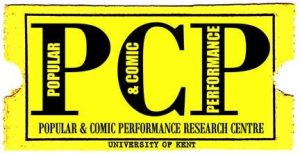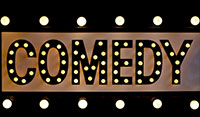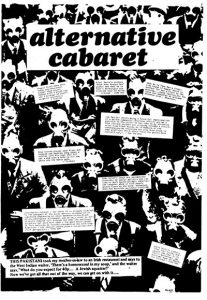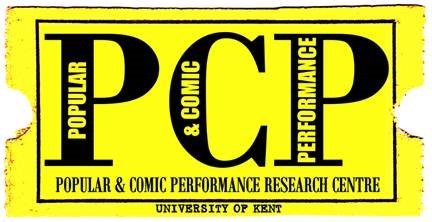
2nd and 3rd May 2019, University of Kent, UK
Organised by the Popular & Comic Performance Research Centre (PCP) and the Centre for Comedy Studies Research (CCSR)
On 19 May 1979, the Comedy Store opened in Soho, London and precipitated the alternative comedy movement, which would revolutionise the style, subject matter and politics of British stand-up. From this point onward, the comedy club – previously unknown in the UK – would begin to replace the variety theatre, working men’s club or folk club as the wellspring of new comic talent. The alternative comedians had a completely different approach from those who immediately preceded them. Instead of buying or borrowing material, they promoted self-authorship, devising gags and routines for themselves. They took established joke structures and stereotypes and turned them inside out. They refocused comedy’s attention on youth, aligning themselves with popular music and reflecting alternative lifestyles. They also made comedy explicitly political, rejecting sexism and racism and becoming part of the left-wing anti-Thatcher culture. The current UK comedy industry, from the smallest DIY comedy club to the arena tour, can arguably trace its origins back to the alternative comedy movement of the 1980s.
 Organised by the Popular & Comic Performance Research Centre (PCP) at the University of Kent and the Centre for Comedy Studies Research (CCSR) at Brunel University London, Alternative Comedy Now will be an international interdisciplinary conference taking stock of this crucial cultural movement, forty years on from its inception. In addition to academic papers, the conference will feature involvement from some of the key figures in alternative comedy, a festival of alternative comedy performance, and an exhibition of early alternative comedy material from the British Stand-Up Comedy Archive.
Organised by the Popular & Comic Performance Research Centre (PCP) at the University of Kent and the Centre for Comedy Studies Research (CCSR) at Brunel University London, Alternative Comedy Now will be an international interdisciplinary conference taking stock of this crucial cultural movement, forty years on from its inception. In addition to academic papers, the conference will feature involvement from some of the key figures in alternative comedy, a festival of alternative comedy performance, and an exhibition of early alternative comedy material from the British Stand-Up Comedy Archive.
 We are also pleased to announce that Alternative Comedy Now will also feature the following keynote sessions:
We are also pleased to announce that Alternative Comedy Now will also feature the following keynote sessions:
- Dr Oliver Double (Reader in Drama, University of Kent) on the origins of alternative comedy. Publications include Stand-Up! On Being a Comedian (Methuen, 1997); Getting the Joke: The Inner Workings of Stand-Up Comedy (Methuen, 2005; revised second edition Bloomsbury, 2014). Britain Had Talent: A History of Variety Theatre (Palgrave, 2012).
- Dr Sophie Quirk (Lecturer in Drama, University of Kent) on forms of alternative comedy that exist today. Publications include: Why Stand-up Matters: How Comedians Manipulate and Influence (Bloomsbury, 2015).
We invite proposals for papers exploring such issues as:
- Precursors. What were the influences on and immediate precursors to alternative comedy? Examples might include: comics who emerged from the British folk scene; alternative theatre companies; and the Manchester student theatre scene.
- What were the key events in establishing alternative comedy as a movement? What were the respective roles of the Comedy Store, the Alternative Cabaret collective, and the Comic Strip?
- How did alternative comedy change the style and form of comic material? Did it merely replace established themes and stereotypes with new ones of its own invention? Did it promote a greater level of ambition for comic creativity?
- How did alternative comedy challenge and reinvent the conventions of British stand-up? Did it establish new performance techniques? What was its effect on the presentation of self, the relationship between performer and audience, etc.?
- What was the political significance of alternative comedy? How did it change the politics of British light entertainment? Did alternative comedy have any significant political effect on broader society? How important or successful was the ‘non-sexist, non-racist’ ethos? How did the movement represent a response to Thatcherism?
- The comedy club. Although long established in America, the phenomenon of the comedy club was unknown in the UK before 1979. How did the comedy circuit spread through the 1980s? How does the comedy club differ as a site for stand-up from earlier venues like the variety theatre or the working men’s club? How were the early alternative comedy clubs different from the comedy clubs of today?
- Key figures in alternative comedy. We invite case studies of some of the most important figures in alternative comedy (e.g. Alexei Sayle, Tony Allen, Pauline Melville, Jim Barclay, Andy de la Tour, Keith Allen, 20th Century Coyote, the Outer Limits, French & Saunders, Arnold Brown, etc.).
Cabaret vs. comedy. The earliest term used to describe the new scene was ‘alternative cabaret’, and this was used interchangeably with ‘alternative comedy’ for a number of years. The use of the word ‘cabaret’ reflects the fact that it was made up of far more than stand-up comedy acts. We invite papers about the other types of act that appeared on in alternative cabaret, including double acts, ranting and dub poets, street performers,
- magicians, ventriloquists, bands and singers, impressionists, and speciality acts.
- How important was America as a precursor to alternative comedy (e.g. the influence of Mort Sahl, Lenny Bruce, etc.)? How does the British scene relate to the American alternative comedy that would later emerge with venues like UnCabaret and the Upright Citizens Brigade Theatre, and performers Like Dana Gould and Janeane Garofalo?
- The provinces and beyond. How did alternative comedy spread beyond London and become established in provincial towns and cities throughout the UK and beyond? What is the significance of the Irish comedy scene which grew up in the late 1980s and produced comics like Dylan Moran and Ardal O’Hanlon?
- Alternative comedy was quickly picked up by television, with shows like The Young Ones and The Comic Strip Presents… How did the transition from live to broadcast affect this emerging comic tradition? How did the influence of TV affect the live scene? How did alternative comedy translate into other mediums (e.g. films, records)?
- What are the influences of alternative comedy? What are the current equivalents of alternative comedy? We invite papers on comedians working today who could be seen as the inheritors of alternative comedy (e.g. Josie Long, Stewart Lee, Bridget Christie, the Alternative Comedy Memorial Society, etc.).
Proposals on other aspects of alternative comedy are also very welcome. Similarly, we would welcome non-standard presentations (e.g. performance papers, workshops, etc.).
Please send a 300-word proposal and a short 100-word bionote to Oliver Double o.j.double@kent.ac.uk and Sharon Lockyer Sharon.Lockyer@brunel.ac.uk by 29th June 2018.
If you have any questions about the Alternative Comedy Now conference, please contact Sharon or Olly via the email addresses above.

